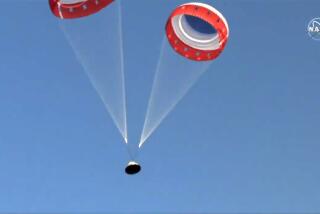Senate Votes to Limit Testing of ‘Star Wars’ System
The Democratic-led Senate, ignoring a White House veto threat, voted Thursday to prohibit any tests of the “Star Wars” space defense system that would violate the traditional interpretation of the 1972 Anti-Ballistic Missile Treaty with the Soviet Union.
The Reagan Administration had not formally proposed to conduct any such tests in the next two years, but Republicans nevertheless mounted a four-month filibuster against congressional restraints on the “Star Wars” effort, known officially as the Strategic Defense Initiative, or SDI.
The 58-38 vote along party lines was an embarrassing setback for President Reagan’s nuclear weapons strategy, occurring as Soviet Foreign Minister Eduard A. Shevardnadze was in Washington to pin down details of a pending treaty to eliminate intermediate-range nuclear missiles and other arms control measures.
The White House said the vote would “undermine our negotiating position” in Secretary of State George P. Shultz’s talks with Shevardnadze and warned that Reagan would veto the $303-billion defense spending bill to which the prohibition is attached if the testing ban is enacted into law.
The leading Democratic advocate of the testing restriction, Sen. Sam Nunn (D-Ga.), later said he would seek a sharp cut in fiscal 1988 spending for the SDI program if Congress fails to override a White House veto.
“If you give them $4.5 billion and they insist on it being a blank check, and they insist on conducting tests that they haven’t even asked for, then we (in Congress) have lost the power of the purse,” he said. “My own vote would be to give them considerably less SDI money.”
Thursday’s battle was only the latest in a series of angry exchanges between the White House and congressional Democrats over the “Star Wars” program and the ABM treaty, which has been generally understood to allow research into anti-missile defenses but to ban most tests of defensive weapons.
The Administration, facing a roadblock to full development of the “Star Wars” defense, rejects that view of the ABM treaty and argues that the restrictions on defensive systems have been misinterpreted.
Reagan’s unyielding support of the “Star Wars” program has been a key issue in arms control negotiations with the Soviet Union, and some say Soviet anxiety over the high-tech defense program has spurred them to make concessions in the arms talks now being wrapped up in Washington.
Noting that the Soviet Union has so far been unsuccessful in persuading Reagan to rule out testing of “Star Wars,” Sen. Pete Wilson (R-Calif.) described the Senate-approved measure as “the most glaring unilateral concession in the history of arms control.”
But Nunn, who co-authored the provision with Sen. Carl Levin (D-Mich.), argued that the measure does nothing more than force the President to abide by the terms of the 1972 treaty.
Expected in 10 Days
The testing restrictions are part of the $303-billion defense spending bill for fiscal 1988, which is expected to pass the Senate within the next week to 10 days.
Although the Senate’s defense bill also must be reconciled with a $298-billion measure passed by the House, the ban on “Star Wars” testing is now certain to be part of the final legislation sent to the President by Congress. The House-passed bill contains a similar provision.
Nevertheless, Republicans contend that the Democrats will not be able to muster the two-thirds vote in the Senate for the measure to be enacted over Reagan’s veto.
“We’ve got the votes to sustain a veto,” said Wilson.
The Nunn-Levin provision would bar the President from conducting advanced tests in space of the SDI system without first obtaining the approval of Congress. It is assumed that Congress still holds to the original interpretation of the treaty.
Until late 1985, when the Administration unveiled a new, broader interpretation of the ABM treaty that is designed to allow for testing of SDI, it was generally accepted that the pact prohibited testing in space of anti-ballistic missile systems.
Nunn contends that the President cannot unilaterally reinterpret any treaty after it has been ratified by the Senate without seeking the approval of that chamber.
“When we ratified this treaty, it became the law of the land,” he said. “Now the question is what does that law mean? It means what the Senate of the United States was told it meant back in 1971 and 1972. If not, what is the ratification process all about? What is the role of the Senate in advise and consent?”
Nunn has made SDI testing a make-or-break issue for the Democrats, threatening to hold up all pending Senate business--including Reagan’s nomination of Supreme Court nominee Robert H. Bork--until it is resolved.
But Republican SDI supporters such as Wilson contend that the Nunn-Levin provision is interfering with the President’s right to negotiate treaties with other foreign powers and doing so at a particularly delicate moment in the history of arms control--just as the United States and the Soviet Union appear to be heading toward a treaty abolishing intermediate-range nuclear weapons.
As reported to the Senate floor by the Armed Services Committee, the defense bill contains $4.5 billion for SDI research--a 22% increase over last year. But Levin warned Reagan during debate on the measure that Congress would be less generous toward the program if it were not for the restrictions imposed by the provision that bears his name.
The House-passed bill contains $3.1 billion for SDI; the Reagan Administration had requested $5.7 billion.
More to Read
Get the L.A. Times Politics newsletter
Deeply reported insights into legislation, politics and policy from Sacramento, Washington and beyond. In your inbox three times per week.
You may occasionally receive promotional content from the Los Angeles Times.










